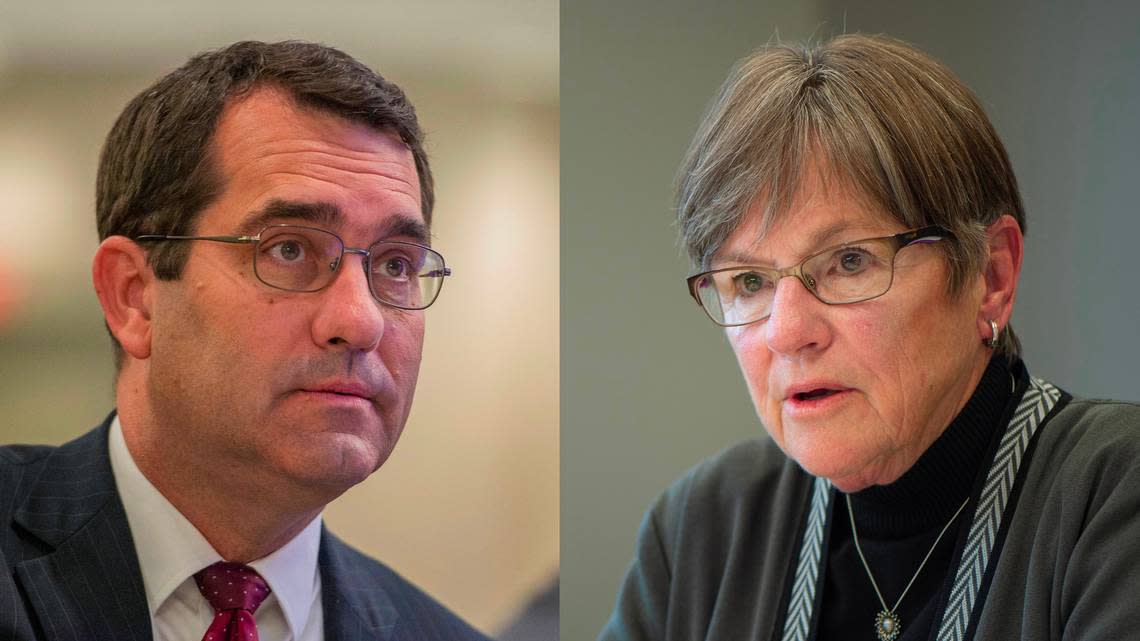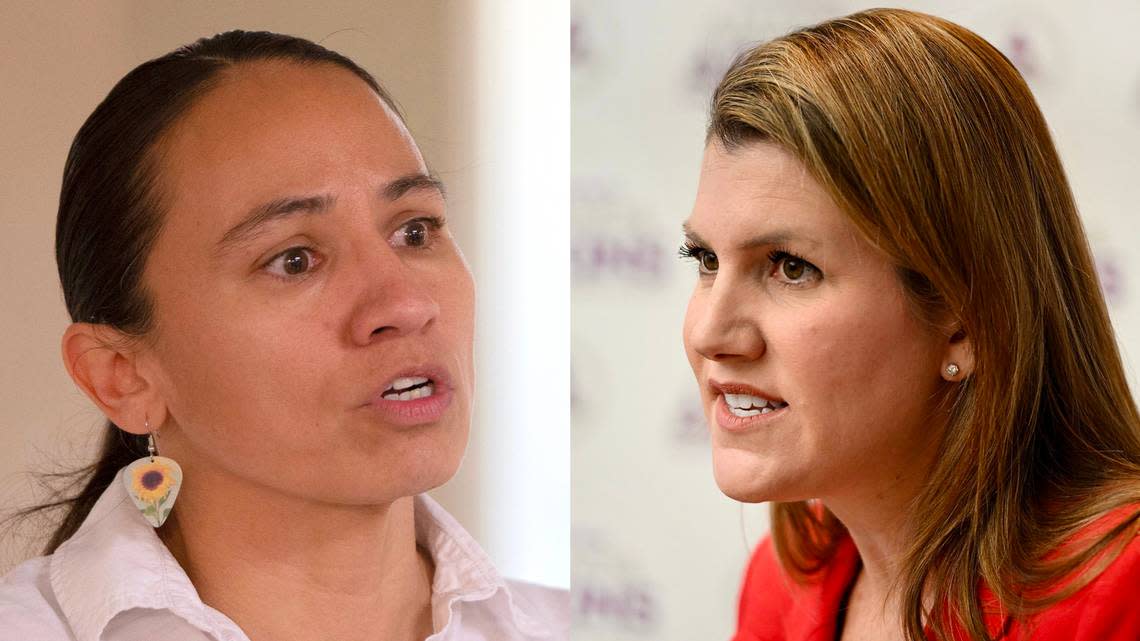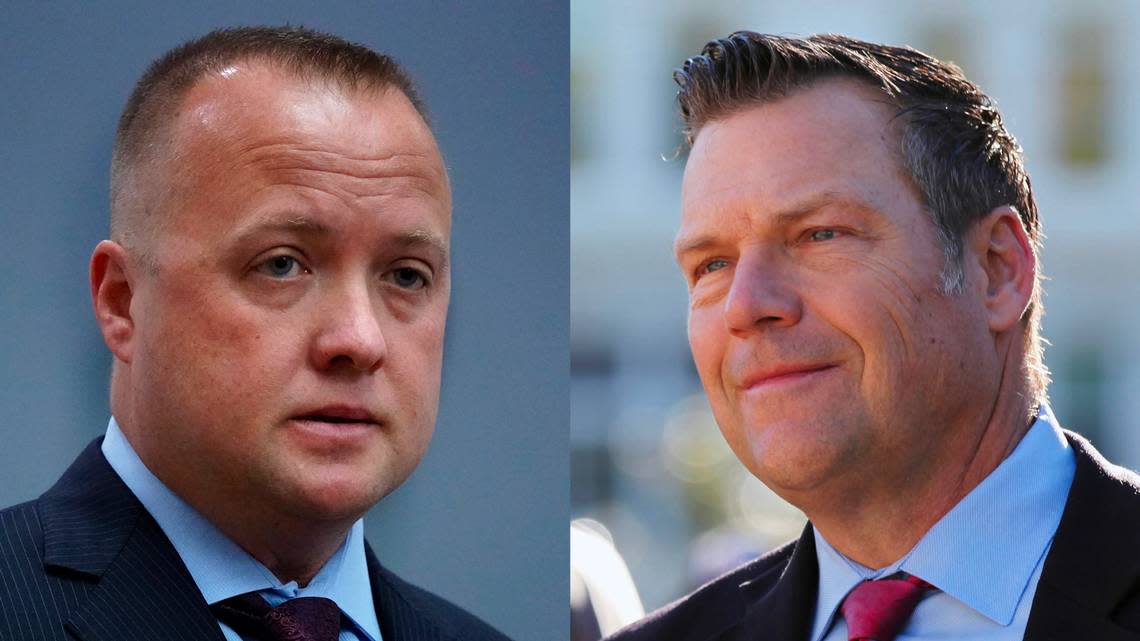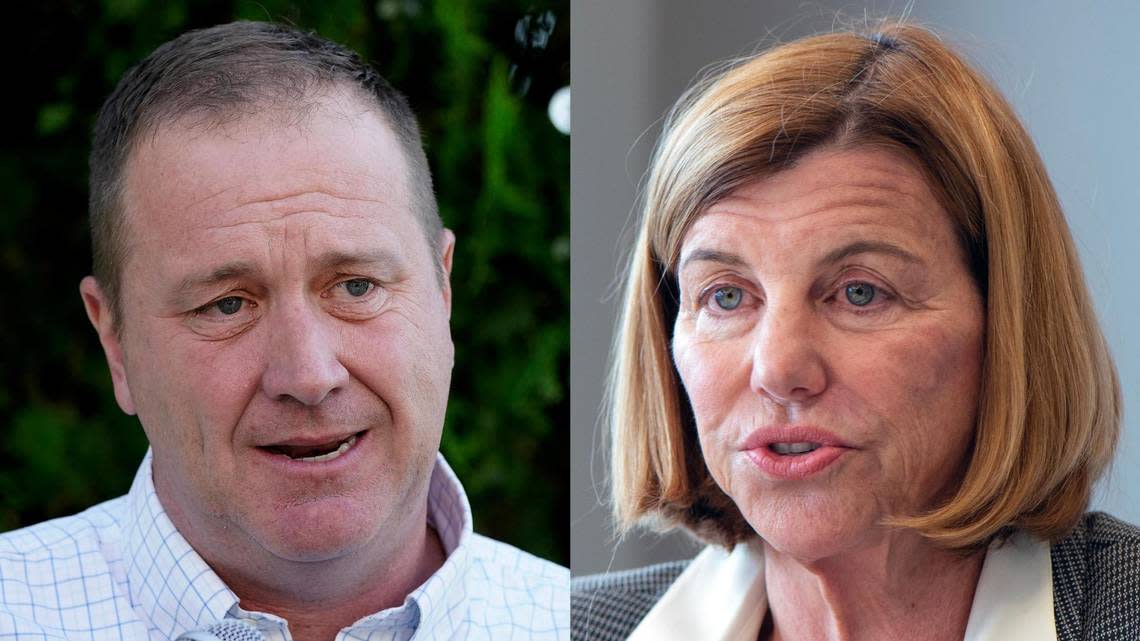From KS governor’s race to MO’s new senator, 6 races to watch in the Kansas City area
On Tuesday, any Kansas or Missouri voters who have not already cast a ballot through early voting will have the chance to hit the polls to elect a new set of leaders and weigh in on ballot initiatives.
Kansans will be choosing a governor and other statewide offices, congressional representatives to send to Washington, D.C., and state representatives to serve in Topeka.
Missourians will vote on five statewide ballot questions as well as for representatives in the U.S. Senate and the U.S. House in Washington, D.C., and in the Missouri State Senate and House of Representatives in Jefferson City.
Polls will be open in Missouri from 6 a.m. to 7 p.m. and in Kansas from 7 a.m. to 7 p.m.
Early voting has already started in Kansas and now in Missouri as well, because of the state’s new voting law that allows any voter to cast a ballot in person absentee in the final two weeks leading up to Election Day.
You can check your voter registration and find your polling place and your districts through your secretary of state’s office. Various polling sites have changed since the primary election in August, so checking to confirm yours before going to vote will help things go as smoothly as possible.
A lot is on the line for Kansas City area residents on both sides of the state line, and at The Star we believe that our democracy is stronger when more people have the information they need to participate in and shape it.
We want to make it as easy as possible for you to decide who is most likely to make choices you believe will best serve you and your community.
This is our guide to the biggest races this Election Day:

Kansas governor
Democratic Gov. Laura Kelly is running for reelection against Republican Attorney General Derek Schmidt, Libertarian Seth Cordell and independent Dennis Pyle.
In a poll released less than a week before Election Day, Kelly and Schmidt were essentially tied in the race, with Kelly leading 46% to 43%, which is within the margin of error. The poll was conducted by Emerson College Polling and The Hill.
Kelly has focused a lot of her campaign on presenting herself as “middle of the road,” promoting support she’s gained among prominent Kansas Republicans and focusing on education and budget issues. She has touted her work of infusing funds into the state’s public schools and has promised to add funds for special education.
In The Star’s voter guide when asked about a policy position she has that crosses partisan lines she wrote: “Working together to get things done is how I’ve always operated. I’ve worked with Republicans in the Legislature to do what is best for Kansans including passing over $1 billion in tax cuts, balancing the budget, investing in our rainy day fund, and axing the food sales tax.”
Schmidt has worked to appeal to more conservative voters in the final weeks of the election and has talked a lot about securing the country’s southern border as a way to address fentanyl overdoses in Kansas and criticizing government overspending. He has also leaned into economic issues and has talked about wanting to combat the effects of inflation by cutting taxes for Kansans.
He did not complete The Star’s voter guide survey after numerous requests over several weeks.

Kansas 3rd Congressional District
Democratic Rep. Sharice Davids is running for reelection against Republican Amanda Adkins.
The two candidates ran against each other in 2020 as well when Davids won by 10 points, but the context of this election is a bit different because of redistricting.
The Kansas Legislature adjusted the boundaries of the 3rd District to remove half of Wyandotte County, the most reliably blue part of the district, in favor of two more rural and Republican-leaning counties south of Johnson County. The new map was widely expected to complicate Davids’ chances at reelection in a year already anticipated to be a red wave.
After August’s landslide vote in favor of abortion rights in Kansas, Davids has focused her campaign on reproductive health care, as well as on addressing the burden of a rising cost of living on Kansans through things like encouraging domestic manufacturing and lowering the cost of drugs.
When asked about a policy position of hers that crosses partisan lines as part of The Star’s voter guide, she wrote: “I believe good ideas can come from Republicans and Democrats, and I’ll work with anyone as long as it’s good for Kansas. So even when it wasn’t popular in my party, I came out in support of a ban on members of Congress trading stocks while in office.”
Adkins has also talked a lot about economic challenges and has largely blamed Davids and the Democrats in Congress for inflation. She says she will push to rein in federal spending and balance the government’s budget.
Adkins did not complete The Star’s voter guide survey after numerous requests.

Kansas attorney general
The current Kansas attorney general, Derek Schmidt, is running for governor. Democrat Chris Mann and Republican Kris Kobach are running against each other for the open position.
So far Mann has focused his message on law enforcement and public safety, leaning heavily on his background as a Lawrence police officer and Wyandotte County prosecutor. In the wake of the U.S. Supreme Court ruling overturning the federal right to an abortion, Mann has said he wouldn’t use his offices resources to limit abortion access.
In The Star’s voter guide when asked about a policy position he has that crosses partisan lines he wrote: “I’m not a partisan guy. I’ve always been a public servant committed to keeping my community safe. As a former police officer and prosecutor, I have an understanding of law enforcement and public safety that may be viewed by some people as uncommon in my political party. I know that it takes partnership between communities and law enforcement to really improve safety and the quality of life of our families.”
Kobach is among the most well-known — and most polarizing — politicians in Kansas. During the Republican primary, he laid out a plan to prioritize the political functions of the office, vowing to take on President Joe Biden in court and re-emphasize voter fraud prosecutions.
He has promised to defend the state’s existing laws regulating abortions, including parental consent requirements for minors seeking the procedure and bans on state-funded abortions and abortions after 22 weeks.
After numerous requests, Kobach did not complete The Star’s voter guide survey.
Other things to know about your Kansas ballot
In addition to the races, Kansans will vote on two amendments to the state constitution, one that would bar Kansas counties from shifting away from a system of electing their county sheriffs. Another amendment that would give the state Legislature more power to veto regulations from state agencies.
Voters will also have the opportunity to retain or reject state and local judges.

Missouri Senate
Republican Sen. Roy Blunt is retiring, and four candidates are running to replace him. The front-runner is Republican Attorney General Eric Schmitt. Democrat Trudy Busch Valentine has been trailing Schmitt by double digits in polls. Libertarian Jonathan Dine and Constitution party candidate Paul Venable are also running.
Schmitt has cast himself as a key ally for conservatives in a struggle with liberals on everything from taxes to gun rights to teaching about race and racism in schools. He has largely campaigned against the policies of Joe Biden and curtailing inflation.
Busch Valentine has advocated for abortion rights at a federal level and has highlighted Schmitt’s role in implementing Missouri’s strict abortion ban, which outlaws the procedure in all cases except for medical emergencies. Her campaign has also focused on gun control and keeping Missouri farmland locally-owned.
When asked about a policy position of hers that crosses partisan lines as part of The Star’s voter guide, she wrote: “I believe that protecting our farmland from foreign ownership is an issue that crosses partisan divides... In 2013 my opponent and the Missouri state legislature voted to allow foreign-owned companies to buy up Missouri farmland. This has led to too many Missouri farmers being pushed out of business and increased food prices for all Missourians. In the Senate, I will proudly stand with Missouri farmers and oppose the foreign ownership of our farmland.”
After numerous requests over a weeks long period, Schmitt did not complete The Star’s voter guide survey.

Missouri marijuana vote: Amendment 3
Amendment 3 would make it legal for those 21 and over to buy and use marijuana, and would create a state program regulating who can get licenses to grow and sell recreational marijuana.
The amendment would also automatically expunge the records of people with past non-violent marijuana-related charges, and would allow those currently incarcerated for marijuana charges to petition for their release.
Voting yes means: Recreational marijuana would be legal in Missouri for adults 21 and over to buy and use, and non-violent marijuana-related charges would be expunged from people’s records. The state would tax its sale at a rate of 6%. Medical marijuana facilities would be able to convert their existing licenses for recreational business, and entrepreneurs hoping to join the industry could apply for a micro-license through a lottery system.
Voting no means: Recreational marijuana would not be made legal to buy, own, use, grow or sell. Medical marijuana laws would stay the same as they are now.
Missouri KCPD funding vote: Amendment 4
The state of Missouri wants to enforce a law that will require Kansas City to spend 25% of its revenue on the KCPD. The city is already required by the state to spend 20% of its revenue on KCPD, and and this year allocated 24.3% of its general revenue to policing. The city estimates that the cost differential between 25% and the current requirement 20% is $38.7 million.
The Missouri Constitution says that the state is not allowed to give mandates to cities without providing any funding to carry out those mandates. This amendment would make an exception for police funding.
While this question will be on ballots statewide, it will only impact the KCPD. Kansas City is the only municipality in the state that does not have local control over its own police force.
Opponents worry that the change would open up the possibility for the state to exercise more power over Missouri cities.
Voting yes means: The state would be allowed to tell Kansas City that it needs to increase the percentage of revenue spent on the KCPD. This would allow a law to go into effect that would raise the minimum requirement for police funding to 25% of the city’s revenue.
Voting no means: The state would not be allowed to raise the required percentage of city money that Kansas City needs to spend on the KCPD. The increase to 25% would likely continue to face legal challenges at the state level.
Rejecting this amendment would NOT put KCPD’s operations under local control– that would require repealing a law from 1939.
The Star’s Katie Bernard, Kacen Bayless, Jonathan Shorman, Daniel Desrochers, Kynala Phillips, Natalie Wallington and Allison Dikanovic contributed.






